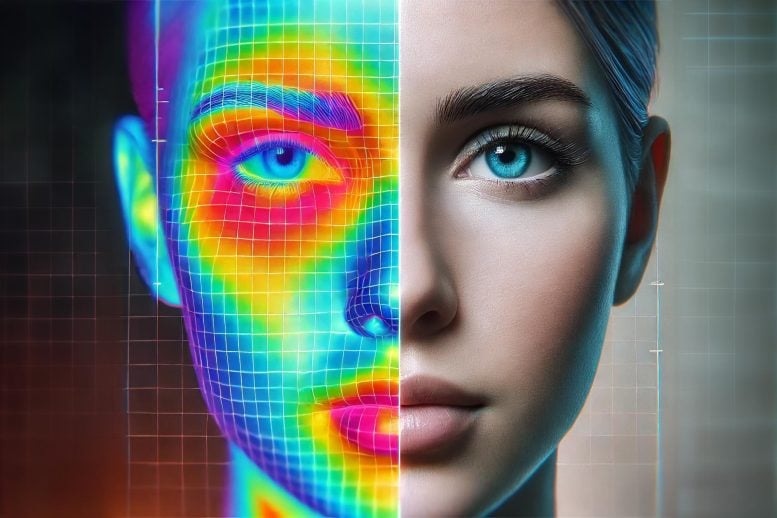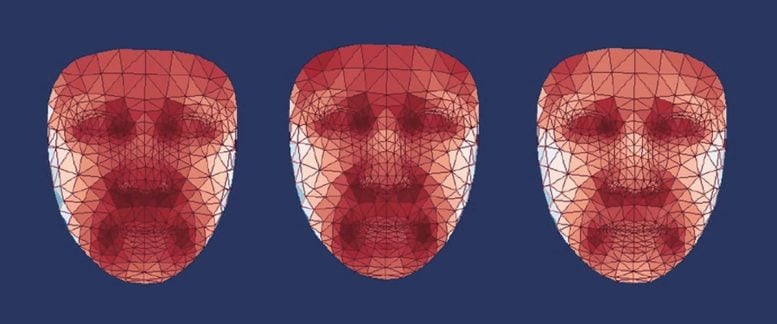
Researchers have found that different facial temperatures correlate with chronic illnesses like diabetes and high blood pressure, and these can be detected using AI with thermal cameras.
They highlight the potential of this technology for promoting healthy aging by using thermal facial imaging to predict a person’s health status and biological age. The study also found that regular physical activities like jumping rope can decrease one’s thermal age, suggesting a possible link between exercise and thermal signs of aging.
A colder nose and warmer cheeks may be a telltale sign of rising blood pressure.
Researchers discovered that temperatures in different face regions are associated with various chronic illnesses, such as diabetes and high blood pressure. These temperature differences are not easily perceptible by one’s own touch but can instead be identified using specific AI-derived spatial temperature patterns that require a thermal camera and a data-trained model. The results were published recently in the journal Cell Metabolism. With further research, doctors could one day use this simple and non-invasive approach for early detection of diseases.

Potential of Thermal Facial Imaging
“Aging is a natural process,” says Jing-Dong Jackie Han, the paper’s corresponding author at Peking University in Beijing. “But our tool has the potential to promote healthy aging and help people live disease-free.”
The team had previously used 3D facial structure to predict people’s biological age, which indicates how well the body is aging. Biological age is closely related to the risk of diseases, including cancer and diabetes. They were curious if other features of the face, such as temperature, could also predict aging rate and health status.
Age and Health Indicators Through Thermal Analysis
Han and her colleagues analyzed facial temperatures of more than 2,800 Chinese participants between the ages of 21 and 88. Then, the researchers used the information to train AI models that could predict a person’s thermal age. They identified several key facial regions where the temperatures were significantly related to age and health, including the nose, eyes and cheeks.
The team found the temperature of the nose decreases with age at a rate faster than other parts of the face, meaning people with warmer noses have a younger thermal age. At the same time, temperatures around the eyes tend to increase with age.
The team also found that people with metabolic disorders such as diabetes and fatty liver disease had faster thermal aging. They tended to have higher eye area temperatures than their healthy counterparts of the same age. People with elevated blood pressure also had higher cheek temperatures.
Exploring Thermal Aging and Disease Connections
By analyzing participants’ blood samples, the team revealed that the increase in temperatures around the eyes and cheeks was mainly because of an increase in cellular activities related to inflammation, such as repairing damaged DNAs and fighting infections. The increase in these activities led to a rise in temperatures in certain facial regions.
“The thermal clock is so strongly associated with metabolic diseases that previous facial imaging models were not able to predict these conditions,” Han says.
Thermal Imaging and Physical Activity
Due to this connection, the team set out to test if exercise could influence thermal age. They asked 23 participants to jump rope for at least 800 times daily for two weeks. To the team’s surprise, these participants reduced their thermal age by five years after just two weeks of exercise.
Next, the team wants to explore if they can use thermal facial imaging to predict other diseases, such as sleeping disorders or cardiovascular problems.
“We hope to apply thermal facial imaging in clinical settings, as it holds significant potential for early disease diagnosis and intervention,” Han says.
Reference: “Thermal facial image analyses reveal quantitative hallmarks of aging and metabolic diseases” by Zhengqing Yu, Yong Zhou, Kehang Mao, Bo Pang, Kai Wang, Tang Jin, Haonan Zheng, Haotian Zhai, Yiyang Wang, Xiaohan Xu, Hongxiao Liu, Yi Wang and Jing-Dong J. Han, 2 July 2024, Cell Metabolism.
DOI: 10.1016/j.cmet.2024.05.012
This work was supported by the National Natural Science Foundation of China and the Ministry of Science and Technology of the People’s Republic of China.